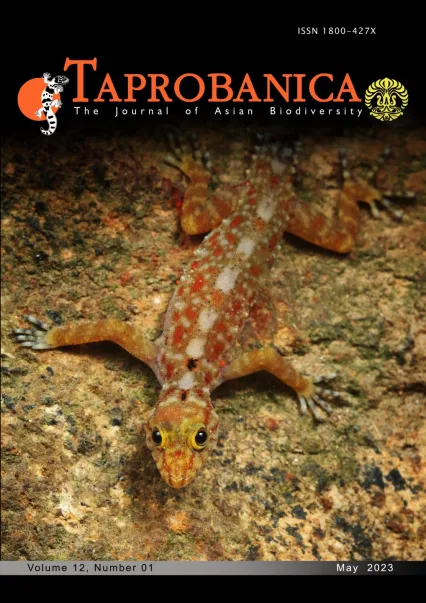

v12i1.302
Volume 12 | Number 1 | May 2023
Short Note
ISSN: 1800-427X (printed)
eISSN: 1800-427X (online)
DOI:10.47605/tapro.v12i1.302
Submitted date: 7 September 2022
Accepted date: 29 March 2023
Published date: 12 May 2023
Pp. 30–32, pls. 18–19
Distribution and natural history notes on the herpetofauna of Ladakh, India
D.A. Patel*, C. Ramesh, S. Ghosal & P. Raina
*Corresponding author. E-mail: dmp8266@gmail.com
The Himalayas is the highest and youngest mountain range in the world. It provides unique habitat characteristics and is home to a unique assemblage of flora and fauna. There is very little information on the herpetofauna and their ecology in the trans-Himalayan region of Ladakh. Ladakh, located in an area of rain shadow, is characterized by extreme weather, climate, and terrain and relatively lower species richness. The region’s elevation ranges from 2,700 m to over 7,000 m a.s.l. and the annual precipitation is ~90–110 mm while the temperature ranges from -30 oC in winters to 30 oC in the summers.
Section Editor: Thasun Amarasinghe
eISSN: 1800-427X (online)
DOI:10.47605/tapro.v12i1.302
Submitted date: 7 September 2022
Accepted date: 29 March 2023
Published date: 12 May 2023
Pp. 30–32, pls. 18–19
Distribution and natural history notes on the herpetofauna of Ladakh, India
D.A. Patel*, C. Ramesh, S. Ghosal & P. Raina
*Corresponding author. E-mail: dmp8266@gmail.com
The Himalayas is the highest and youngest mountain range in the world. It provides unique habitat characteristics and is home to a unique assemblage of flora and fauna. There is very little information on the herpetofauna and their ecology in the trans-Himalayan region of Ladakh. Ladakh, located in an area of rain shadow, is characterized by extreme weather, climate, and terrain and relatively lower species richness. The region’s elevation ranges from 2,700 m to over 7,000 m a.s.l. and the annual precipitation is ~90–110 mm while the temperature ranges from -30 oC in winters to 30 oC in the summers.
Section Editor: Thasun Amarasinghe
- List of Articles & Contents





